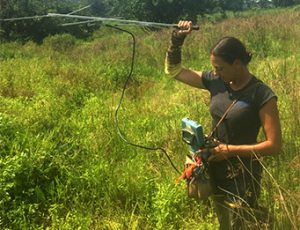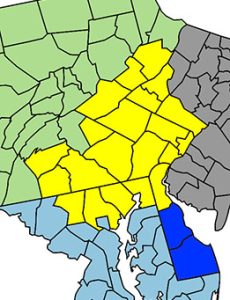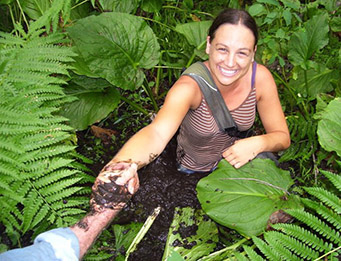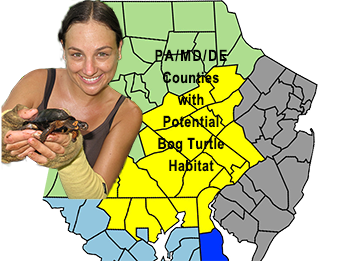Landmark’s Bog Turtle team, led by Amy Nazdrowicz, a Qualified Bog Turtle Surveyor (QBTS) and Professional Wetland Scientist (PWS), is gearing up for the 2024 Bog Turtle season. They are now scheduling Phase II Bog Turtle Investigations.
Download 2024 Bog Turtle Information sheet

Discuss Your Needs Today!
Call Amy without delay if you need any type of Bog Turtle Investigation (BTI) – whether it is a Phase I, II, III or construction monitoring. Don’t wait until the last minute to get it on the schedule! Read on for the reasons procrastinating can work against you and your project schedule. And for those considering purchasing a property for development in one of the highlighted counties shown on the map, we highly recommend having a Phase I BTI done during your due diligence period.
Seasonal Restrictions: April 15 to June 15
Seasoned engineers and land developers in our region are usually aware that Phase II Bog Turtle Investigations can only be conducted between April 15 and June 15. But what is sometimes not as well known is that at least two of the four Surveys comprising a Phase II Investigation must be conducted in May. (Also, there are minimum days that must be left in between Surveys and strict weather criteria that must be maintained through each Survey).

Planning and Permits Take Time
Up-front planning and agency coordination is a required first step that can take time. So, it is important to reach out to a Recognized Qualified Bog Turtle Surveyor, certified in the state in which the property is located, as soon as you are aware that the investigation will be needed. Waiting until mid-April to schedule your Phase II Investigation can waste valuable time in the notoriously busy and short period in which Phase II Surveys are allowed to take place.
In some states like Maryland and Pennsylvania, the specific site must be added onto the Bog Turtle Surveyor’s existing Scientific Collectors Permit before any Phase II Surveys can occur. In Maryland, (and again this year in Pennsylvania, too, because their online permitting site remains down), all applicants must apply through the U.S. mail. Even simply adding a new site to a Collectors Permit must be done through the mail. Depending on how busy the state’s Permit Coordinator(s) are at the time, this process can take several days or even weeks.
Every site is different
Coordination with both the state regulatory agency and the U.S. Fish and Wildlife Service must first be conducted in order to ensure that they will accept the specifics of the investigation. It is imperative that the agencies approve the exact acreage of search area and the proposed search effort prior to the start of the Phase II Investigation.
The current Phase II protocol states that all potential habitat areas be searched at 4 to 6 person-hours per acre. The search effort of the investigation will depend on the quality of the habitat present, but also on information that may only be known by the regulators such as the distance to the nearest known Bog Turtle colony. In order to determine that information, the regulators will need time to review the Phase I Bog Turtle Investigation Report and associated maps.
New Federal Guidance = More Phase III Investigations (trapping)
Finally, with recent guidance published by the U.S. Fish & Wildlife Service, there are now more circumstances where the agencies could require that a Phase III (trapping) Investigation be conducted. (Phase III Bog Turtle Investigations are live trapping studies where 20 traps per acre of habitat are set out and checked daily for 20 consecutive days). Examples include the presence of especially high-quality habitat or especially dense invasive plant species that could impede the efficacy of Phase II searching techniques. Also, a Phase III Investigation is now required whenever the potential habitat exceeds two acres in size.
Usually, a Phase III Investigation is conducted concurrently with a Phase II Investigation, where traps are installed into the habitat following the completion of the second Phase II Survey. To avoid disturbing any Bog Turtle nests, all Phase III Investigations must be completed by June 15. So, in order to allow for the 20 days of consecutive trapping, all traps must be installed by May 27, 2024.

Bog Turtles remain inactive during the summer months entering into a type of dormancy called “estivation.” But in the Fall, Bog Turtles become active again and will travel into the area of their habitat where they will hibernate through the winter. Because of this brief period of increased activity, states will occasionally permit a Phase III Investigation to be conducted in September.
Phase III Bog Turtle Investigations require even more up-front planning and agency coordination than those of Phase IIs. Additionally, an entirely separate permit is often required for Phase III Trapping Investigations in addition to the Surveyor’s Scientific Collectors Permit.
Don’t Panic!
If all of this information seems overwhelming and the makings of a logistical nightmare, fear not! Landmark’s Bog Turtle Surveyor, Amy Nazdrowicz, is more than familiar with the various Bog Turtle Investigations, their protocols, and the most cost-efficient options available to her clients. All you need to remember is not to procrastinate in calling her to schedule your Bog Turtle Investigations!
Call Today!
Amy is a Recognized Qualified Bog Turtle Surveyor certified in Delaware, Maryland, and Pennsylvania and she is also a Professional Wetland Scientist. Contact Amy at 302-218-3630 (mobile) or by email at: amyn@landmark-se.com.

